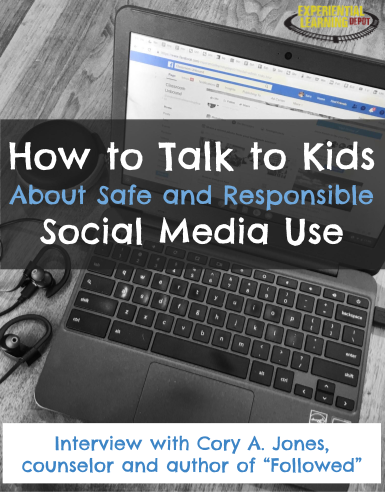|
Experiential learning resources for the innovative educator
Teachers and parents of the 21st-century have a challenge to face and the responsibility to confront that challenge. Technology is a prominent and permanent part of modern society. It is a blessing and a curse, particularly when it comes to social media and children.
We have all been faced with the need to make important decisions for our children when it comes to technology; at what age to allow them to have their first cell phone, whether to let them use social media as a research or presentation tool in class for school projects, how much time to allow them on social media each day if at all, whether to install child monitoring software to home or school computers.
These are all legitimate decisions to make as parents and educators. We want children to be able to utilize all of the amazing learning tools that technology has to offer, but also want them to be safe. Technology is evolving rapidly. Generation Z is all over it. They know the latest trends the moment they start trending. My four-year-old knows how to use a photo editing app on my phone better than I do.
It is illogical to think that I will always know what my children and students are doing on social media at any given time. Therefore, rather than obsessing over how to control it, Cory A. Jones, author of "Followed", contends that we should embrace it and help students learn how to navigate it. He does so through realistic storytelling. Cory wrote "Followed" as a teaching tool for young people, parents and educators to help navigate the social media scene responsibly and safely. 
Cory Alexander is an educator, author, serial dreamer, and entrepreneur. He holds a Bachelor Degree in Deviant Behavior & Social Control from John Jay College of Criminal Justice and a Masters Degree in Education: School Counseling from Liberty University. Now, Cory is a high school guidance counselor as well as the founder of Harlem Press, LLC. and Rise Career Academy, an on-demand career mentoring program. He is also the author of Followed: Who's Following YOU? A compelling story of a group of typical, modern-day teens navigating their way through social channels and personal emotions. Using Storytelling to Talk to Kids About Safe and Responsible Social Media Use: Start the Conversation1. You’ve written a book called “Followed”. What is the premise of the book? The book's objectives are three-fold: 1) To encourage young people to think before they post, take a moment of pause, and proceed through a set of standards. Post with a purpose. 2) Be aware that their social media expressionism creates a digital footprint, a resume, and paints a picture about them whether they like it or not. 3) Be wary of strangers. Things aren’t always what they seem. There is a staggering amount of fake accounts and people with bad intentions trying to connect for the sole purpose of taking advantage of you.
2. What inspired the book?
Being a guidance counselor I wanted to really help young ladies. Overall, I have a sense of fairness and I don’t like people being bullied and taken advantage of. I’ve experienced girls finding themselves in compromising positions due to poor judgment in sending a nude pic or saying things online that cause massive disagreements, which lead to physical fights and ruined relationships. I also notice the self-esteem issues. I know it’s difficult growing up, finding your way, and trying to navigate friendships and family obligations. Social media adds a level of complexity to an overall complex time in their lives. Those middle and high years are rough on many levels. Helping young people and sharing a story that they can relate to with the hope of encouraging them to pick us some tips from the story is what inspired me to write Followed. 3. As a school counselor, you have likely seen social media risks at play. What can you say about those experiences? Was your plot line or were your characters based on true events? As a school counselor, my heart has broken more than a few times. I’ve witnessed shame and stress caused by sexting and arguments escalate to physical altercations because of social media comments and post. Embarrassingly, fights are first videoed before anyone considers breaking them up. Still an act that I just can’t get used to. The characters in the book without question share traits with many of my students. The plot, not so much. Some of the behavior in the plot is general to any high school in the world. That’s why the book works. It’s real life and extremely relatable. 4. Your solution has been to teach kids about responsible use of social media through realistic storytelling. What inspired this avenue for educating students? I’m such a respecter of persons regardless of age. I grew up in a single family household and I had to independently make decisions on my own so often. Because of this, I don’t look down on younger people like their trials and stresses are less than. With that, I wanted to “share” a story on what could happen to them or loved ones if they're not careful on social media, I want to do more than just state facts that they may or may not remember. I’m of the opinion that we learn in story form. Books, movies, and music are very good storytelling vehicles. I’ve read things that have stuck with me because of how it was presented. I’ve learned from movies because of how it was presented and I’ve gotten some of my best advice from observing what happened to someone else. 5. Does the book include resources for teachers and parents such as curriculum or discussion guides? I so much believe that the advance in society as a collective starts when we dialog amongst each other, so I created end-of-chapter questions that a teacher or parent can use to help kids share what they’ve experienced online. This is best in group settings so that we can share and learn that we’re not alone in dealing with social media anxieties and an unhealthy attachment to tech in general. I recently did a group talk with my students titled, “Social Media & Cell Phone Over-Usage”. It was great how students shared what hurt about social media, what they would like to see changed, and what part they want to play in that change.
6. If you could give parents a tip to help them navigate the world of teens and social media, what would it be?
If I had just one tip I would say talk. Share stories you’ve heard, both good (i.e. someone raised money using social media), and bad (i.e. someone got hurt because…) Create an environment where you share what you’ve learned and ask them about the trends they're noticing. Interestingly enough, when you get kids talking, they really share (probably more than they planned). 7. If you could give teachers one tip to help them navigate social media when it comes to their students, what would it be? One tip for teachers/educators is to get involved. No longer can we be passive on social media. We need to talk about it, help them navigate their way on it. It’s not going away. We have to embrace it. Our parents had to embrace the change in language and sexuality on T.V. and cable. Their parents had to embrace the change in music, etc. Every generation has challenges and new norms. By embracing social media, we can make effective change and common sense behavior for our students.
Book Resources:
For resources and more information on Followed, visit Followedthebook.com Check out these free chapters: Chapter 7 and Chapter 8 Take a look at these supplemental worksheets. The book can be found for purchase on Amazon. If you have read the book "Followed" and want to support the author, vote his book for a 2019 Author Academy Award! Click the link and find the YA category. Good luck, Cory! What have been your experiences with teens and social media? What works in the classroom? What doesn't? Parents, what works for you and your children? Any resources, tips, suggestions are welcome! Follow Experiential Learning Depot on Pinterest, Instagram, and Facebook for more on experiential education. Check out student-directed curriculum in my TpT store, Experiential Learning Depot. Observe. Question. Explore. Share.
5 Comments
6/27/2022 06:01:15 am
This is why social media can occasionally be harmful to our children. Devices are useful for conducting research and communicating with loved ones. However, if it's merely for the purpose of documenting social events or boasting about things on social media, parents should be concerned.
Reply
7/24/2022 02:41:00 am
Reply
10/5/2022 06:14:14 am
This is best in group settings so that we can share and learn that we’re not alone in dealing with social media anxieties and an unhealthy attachment to tech in general. Thank you for taking the time to write a great post!
Reply
3/22/2023 10:03:11 pm
Nice and helpful tips that parents can follow for their kids learning needs.
Reply
Your comment will be posted after it is approved.
Leave a Reply. |
Blog IntentTo provide innovative educational resources for educators, parents, and students, that go beyond lecture and worksheets. AuthorSara Segar, experiential life-science educator and advisor, curriculum writer, and mother of two. Categories
All
|









 RSS Feed
RSS Feed